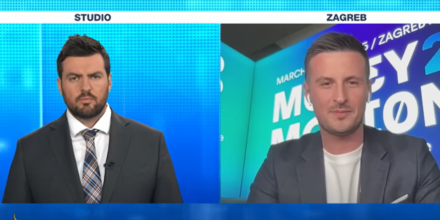A packed hall at the Faculty of Economics in Zagreb hosted a discussion that brought together the experience, innovation, and enthusiasm of future economists. Under the intriguing title TradFi vs. DeFi: The Future of Finance, participants had the opportunity to listen to top industry experts, co-founders of the largest regional fintech conference, Money Motion Conference, which gathered 2,000+ visitors this March.
The discussion was moderated by Damir Čaušević, CEO of Monri Payments, and was discussed by Igor Gržalja, CEO of ASEE Croatia, and Nikola Škorić, founder and director of Electrocoin.
The key question: do we trust decentralized options or an established intermediary?
In this panel discussion, Nikola Škorić, as the founder of a cryptocurrency exchange, presented decentralized finance (DeFi), while Igor Gržalja presented the side of traditional finance (TradFi), at least indirectly, because although he does not come from a bank, he comes from a company that has been a technology partner to most Croatian banks for many years.
Škorić introduced the key advantages of decentralized finance (DeFi), emphasizing the resilience of the system: “If PayPal goes down, DeFi users can still use their money, there is no panic.” He explained that in 2008, Bitcoin began as a means of electronic payment, a peer to peer cash system, but it introduced the revolutionary concept of decentralization in finance, which continued to develop in logical steps, so today we are also decentralizing other financial services, such as the stock market, loans, insurance, and the like.
On the other hand, Igor Gržalja presented traditional finance (TradFi) as a pillar of trust: “Banks are here because we needed them, and we need them today just as much as we did 600-700 years ago. Decentralization is a nice idea, but people need someone in the middle who they can trust. Banks have been and remain reliable intermediaries between those who have funds and those who need funds.”
Gržalja emphasized that banks invest enormous effort and resources in fraud protection and that they often struggle with advanced cyber-attacks that users are not even aware of, so that behind the seemingly calm facade lies a dynamic world of work in a bank.
The importance of financial literacy
The interaction with the audience during the debate was excellent and maintained a positive atmosphere. Students and high school students in the audience showed a high level of interest in the topic. Gržalja’s question about who would rather lend him 50 euros, with a guaranteed return on investment and profit; and who would be willing to lose those 50 euros caused a rapid raising and lowering of hands, accompanied by laughter. One of the students in the audience said: “I don’t invest what I’m not willing to lose!“.
Gržalja highlighted this example to emphasize the importance of financial literacy of all participants in the financial system, pointing out that many people do not have enough knowledge to properly assess the risks they are taking, and that is precisely why we leave it to experienced banks to make decisions for us, and yes, those decisions may be conservative, but that is precisely what has enabled the stability of the financial system.
Perspectives of bankers and crypto enthusiasts – what does the future hold?
Škorić pointed out that the perception of banks towards cryptocurrencies has changed significantly in the last 14 years, when the average banker did not know what cryptocurrencies were, which is no longer the case today. “DeFi brings high risk, and banks are at their core risk-averse institutions, and it is expected that changes and new services will come slowly.”
Škorić pointed out that banks initially strongly resisted crypto companies, which included closing accounts with his company, Electrocoin. Today, despite a cautious approach, some banks are starting to adopt innovations related to blockchain technology. Škorić pointed out that they have the best partnership with the state bank.
Damir Čaušević noted that TradFi and DeFi are already in close cooperation today, because although we talk about the concepts as opposites, the systems work together and complement each other: “When we buy cryptocurrencies, we often pay with cards, when we withdraw money, we send it to cards and bank accounts. DeFi is based on TradFi.” Škorić replied that this was inevitable, because the foundation of our society is the traditional financial system.
Igor Gržalja concluded that he sees the future in further cooperation between traditional and decentralized systems: “DeFi makes sense in segments where TradFi encounters limitations. However, there is no point in changing what already works exceptionally well, just for the sake of change.”

Too little time for great questions from the audience
Students from the audience took the opportunity to ask numerous questions, and the co-founders of Money Motion commented on the following topics:
- Will the digital euro replace cash? (No, but the decreasing use of cash is definitely the direction we are moving in),
- The influence of politics on the financial sector (It certainly exists, we observe it both on the domestic and foreign scene, but the intentional measure and the economic effect are not always proportional)
- The future of altcoins and which coins should be singled out (the panelists, to the laughter of the audience, avoided giving investment advice)
The energy in the hall was excellent, and the luckiest among those present will have the opportunity to attend the upcoming edition of the Money Motion conference, which will be held on March 27th and 28th, 2025 at the Zagreb Fair.















